A Review on How Vitamin D Influences the Immune System and Diseases
VerifiedAdded on 2022/08/14
|13
|3522
|16
Essay
AI Summary
This essay provides a comprehensive review of the relationship between vitamin D and the immune system. It begins by introducing vitamin D, its sources (including foods and sunlight), and the causes of deficiency. The discussion then explores the physiological roles of vitamin D, including its impact on bone health and immune function. The paper delves into the functions of vitamin D in both innate and adaptive immunity, detailing how it modulates immune cell activity and influences the response to pathogens. Furthermore, the essay examines the connection between vitamin D deficiency and various autoimmune diseases, such as rheumatoid arthritis, systemic lupus erythematosus, inflammatory bowel disease, and type 1 diabetes, explaining the mechanisms through which vitamin D may influence the development and progression of these conditions. The review concludes by highlighting the benefits of maintaining optimal vitamin D levels for overall health and disease prevention.
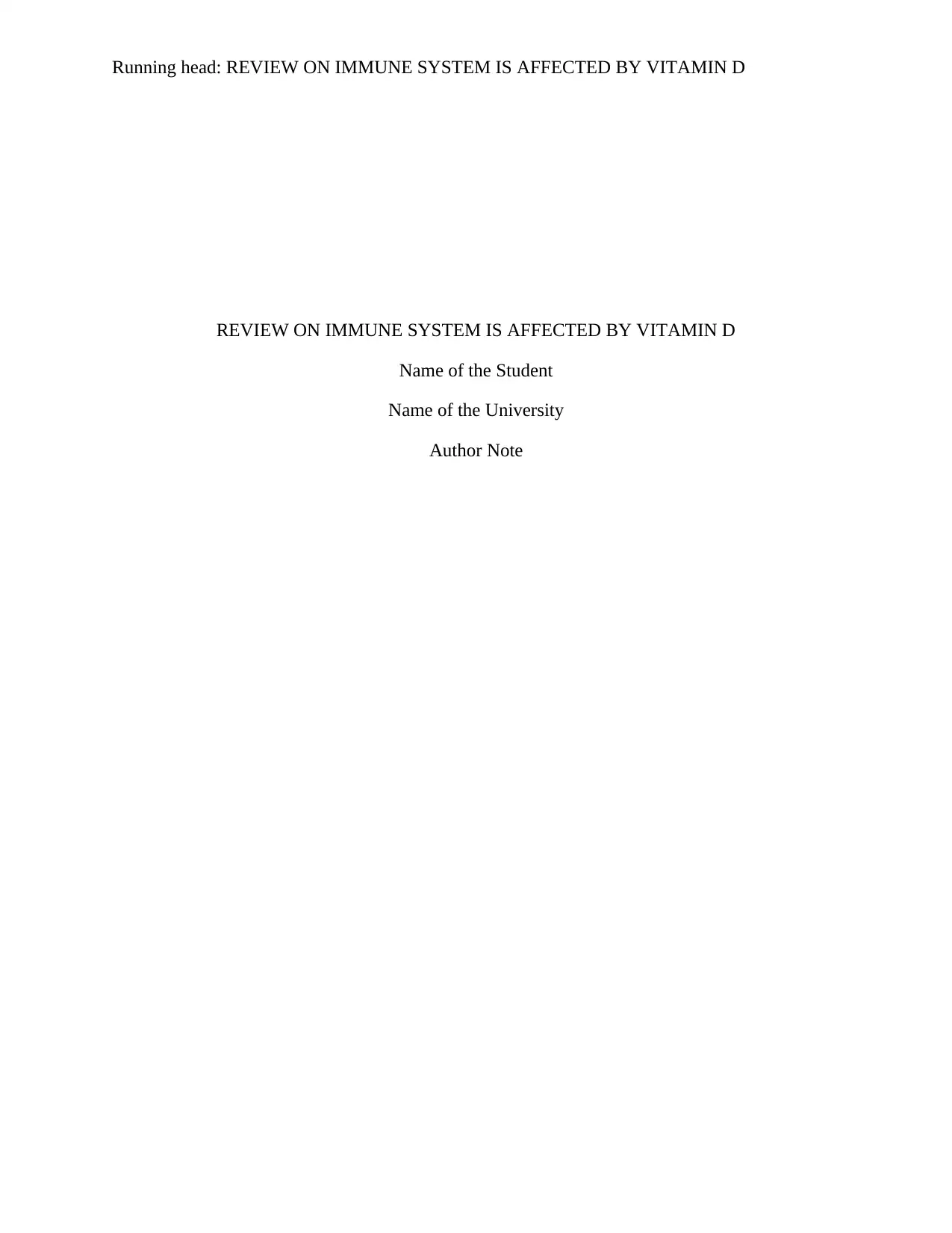
Running head: REVIEW ON IMMUNE SYSTEM IS AFFECTED BY VITAMIN D
REVIEW ON IMMUNE SYSTEM IS AFFECTED BY VITAMIN D
Name of the Student
Name of the University
Author Note
REVIEW ON IMMUNE SYSTEM IS AFFECTED BY VITAMIN D
Name of the Student
Name of the University
Author Note
Paraphrase This Document
Need a fresh take? Get an instant paraphrase of this document with our AI Paraphraser
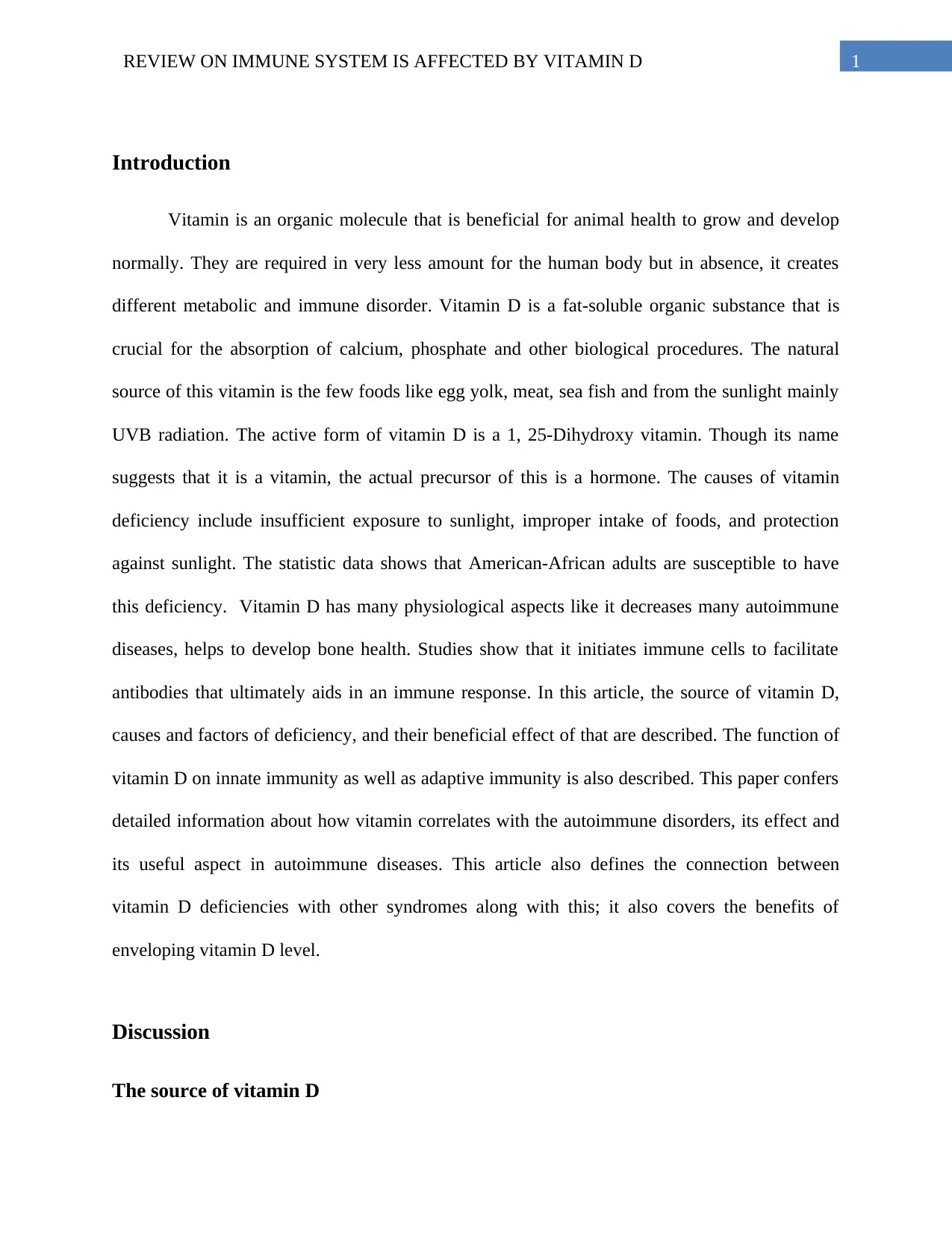
1REVIEW ON IMMUNE SYSTEM IS AFFECTED BY VITAMIN D
Introduction
Vitamin is an organic molecule that is beneficial for animal health to grow and develop
normally. They are required in very less amount for the human body but in absence, it creates
different metabolic and immune disorder. Vitamin D is a fat-soluble organic substance that is
crucial for the absorption of calcium, phosphate and other biological procedures. The natural
source of this vitamin is the few foods like egg yolk, meat, sea fish and from the sunlight mainly
UVB radiation. The active form of vitamin D is a 1, 25-Dihydroxy vitamin. Though its name
suggests that it is a vitamin, the actual precursor of this is a hormone. The causes of vitamin
deficiency include insufficient exposure to sunlight, improper intake of foods, and protection
against sunlight. The statistic data shows that American-African adults are susceptible to have
this deficiency. Vitamin D has many physiological aspects like it decreases many autoimmune
diseases, helps to develop bone health. Studies show that it initiates immune cells to facilitate
antibodies that ultimately aids in an immune response. In this article, the source of vitamin D,
causes and factors of deficiency, and their beneficial effect of that are described. The function of
vitamin D on innate immunity as well as adaptive immunity is also described. This paper confers
detailed information about how vitamin correlates with the autoimmune disorders, its effect and
its useful aspect in autoimmune diseases. This article also defines the connection between
vitamin D deficiencies with other syndromes along with this; it also covers the benefits of
enveloping vitamin D level.
Discussion
The source of vitamin D
Introduction
Vitamin is an organic molecule that is beneficial for animal health to grow and develop
normally. They are required in very less amount for the human body but in absence, it creates
different metabolic and immune disorder. Vitamin D is a fat-soluble organic substance that is
crucial for the absorption of calcium, phosphate and other biological procedures. The natural
source of this vitamin is the few foods like egg yolk, meat, sea fish and from the sunlight mainly
UVB radiation. The active form of vitamin D is a 1, 25-Dihydroxy vitamin. Though its name
suggests that it is a vitamin, the actual precursor of this is a hormone. The causes of vitamin
deficiency include insufficient exposure to sunlight, improper intake of foods, and protection
against sunlight. The statistic data shows that American-African adults are susceptible to have
this deficiency. Vitamin D has many physiological aspects like it decreases many autoimmune
diseases, helps to develop bone health. Studies show that it initiates immune cells to facilitate
antibodies that ultimately aids in an immune response. In this article, the source of vitamin D,
causes and factors of deficiency, and their beneficial effect of that are described. The function of
vitamin D on innate immunity as well as adaptive immunity is also described. This paper confers
detailed information about how vitamin correlates with the autoimmune disorders, its effect and
its useful aspect in autoimmune diseases. This article also defines the connection between
vitamin D deficiencies with other syndromes along with this; it also covers the benefits of
enveloping vitamin D level.
Discussion
The source of vitamin D
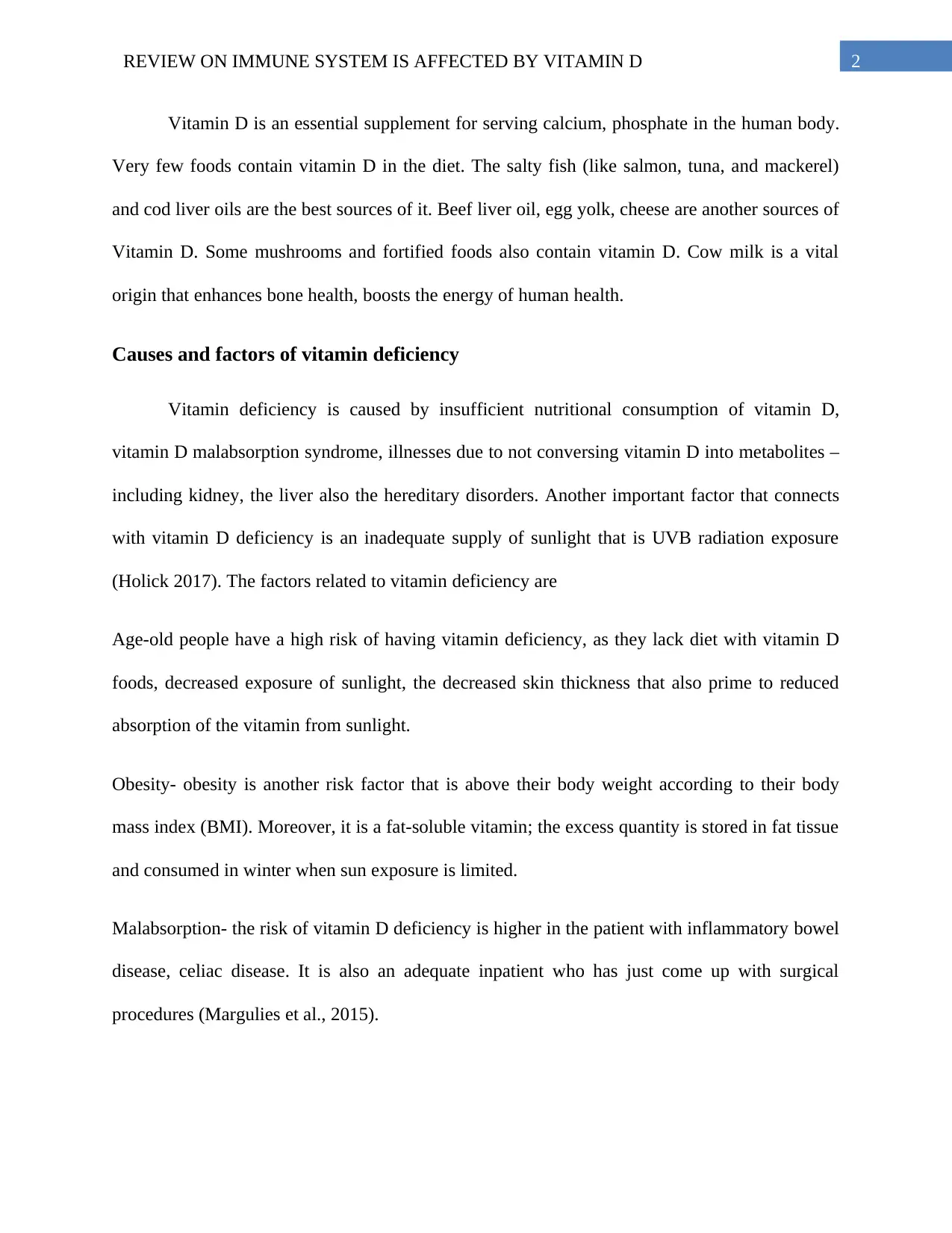
2REVIEW ON IMMUNE SYSTEM IS AFFECTED BY VITAMIN D
Vitamin D is an essential supplement for serving calcium, phosphate in the human body.
Very few foods contain vitamin D in the diet. The salty fish (like salmon, tuna, and mackerel)
and cod liver oils are the best sources of it. Beef liver oil, egg yolk, cheese are another sources of
Vitamin D. Some mushrooms and fortified foods also contain vitamin D. Cow milk is a vital
origin that enhances bone health, boosts the energy of human health.
Causes and factors of vitamin deficiency
Vitamin deficiency is caused by insufficient nutritional consumption of vitamin D,
vitamin D malabsorption syndrome, illnesses due to not conversing vitamin D into metabolites –
including kidney, the liver also the hereditary disorders. Another important factor that connects
with vitamin D deficiency is an inadequate supply of sunlight that is UVB radiation exposure
(Holick 2017). The factors related to vitamin deficiency are
Age-old people have a high risk of having vitamin deficiency, as they lack diet with vitamin D
foods, decreased exposure of sunlight, the decreased skin thickness that also prime to reduced
absorption of the vitamin from sunlight.
Obesity- obesity is another risk factor that is above their body weight according to their body
mass index (BMI). Moreover, it is a fat-soluble vitamin; the excess quantity is stored in fat tissue
and consumed in winter when sun exposure is limited.
Malabsorption- the risk of vitamin D deficiency is higher in the patient with inflammatory bowel
disease, celiac disease. It is also an adequate inpatient who has just come up with surgical
procedures (Margulies et al., 2015).
Vitamin D is an essential supplement for serving calcium, phosphate in the human body.
Very few foods contain vitamin D in the diet. The salty fish (like salmon, tuna, and mackerel)
and cod liver oils are the best sources of it. Beef liver oil, egg yolk, cheese are another sources of
Vitamin D. Some mushrooms and fortified foods also contain vitamin D. Cow milk is a vital
origin that enhances bone health, boosts the energy of human health.
Causes and factors of vitamin deficiency
Vitamin deficiency is caused by insufficient nutritional consumption of vitamin D,
vitamin D malabsorption syndrome, illnesses due to not conversing vitamin D into metabolites –
including kidney, the liver also the hereditary disorders. Another important factor that connects
with vitamin D deficiency is an inadequate supply of sunlight that is UVB radiation exposure
(Holick 2017). The factors related to vitamin deficiency are
Age-old people have a high risk of having vitamin deficiency, as they lack diet with vitamin D
foods, decreased exposure of sunlight, the decreased skin thickness that also prime to reduced
absorption of the vitamin from sunlight.
Obesity- obesity is another risk factor that is above their body weight according to their body
mass index (BMI). Moreover, it is a fat-soluble vitamin; the excess quantity is stored in fat tissue
and consumed in winter when sun exposure is limited.
Malabsorption- the risk of vitamin D deficiency is higher in the patient with inflammatory bowel
disease, celiac disease. It is also an adequate inpatient who has just come up with surgical
procedures (Margulies et al., 2015).
⊘ This is a preview!⊘
Do you want full access?
Subscribe today to unlock all pages.

Trusted by 1+ million students worldwide
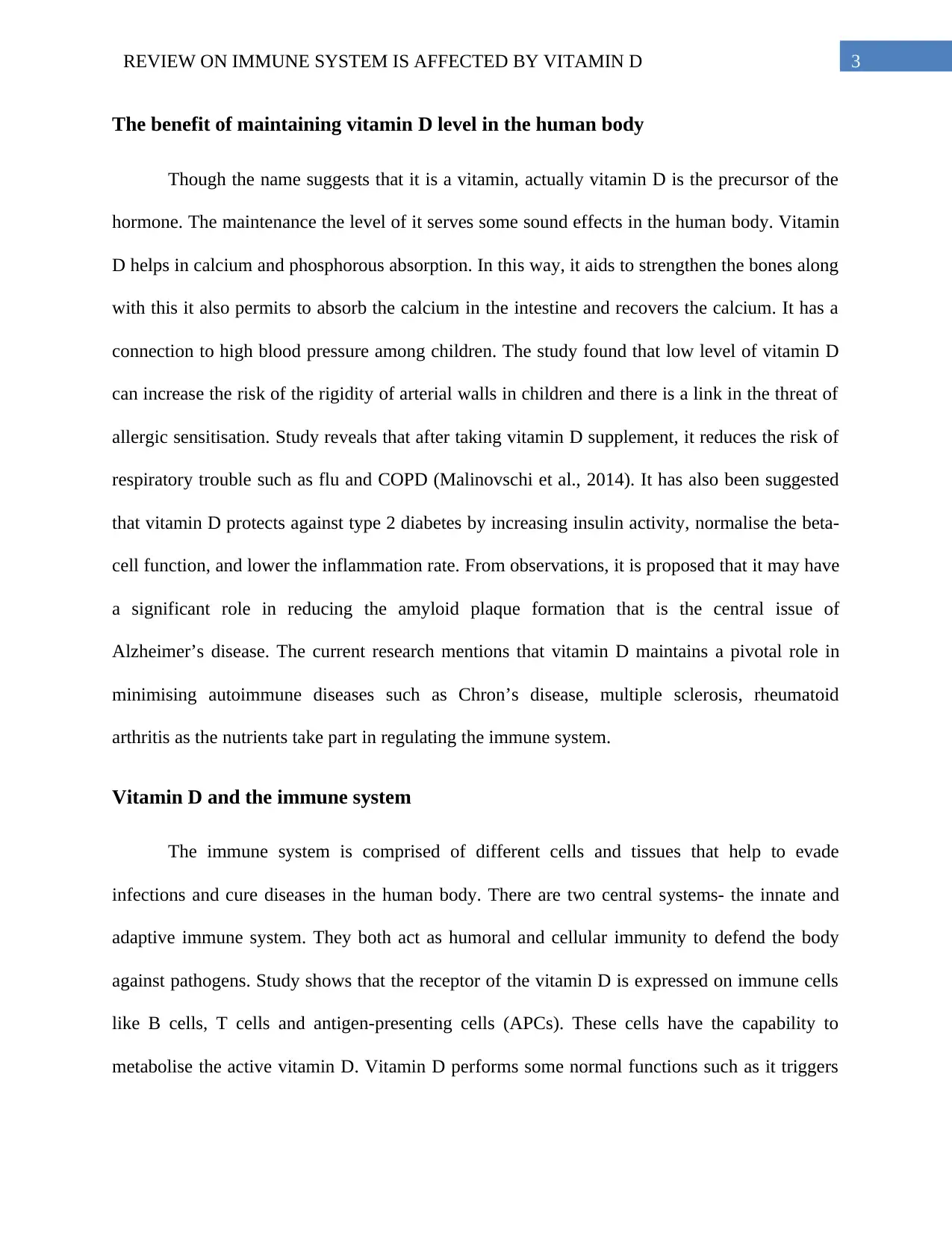
3REVIEW ON IMMUNE SYSTEM IS AFFECTED BY VITAMIN D
The benefit of maintaining vitamin D level in the human body
Though the name suggests that it is a vitamin, actually vitamin D is the precursor of the
hormone. The maintenance the level of it serves some sound effects in the human body. Vitamin
D helps in calcium and phosphorous absorption. In this way, it aids to strengthen the bones along
with this it also permits to absorb the calcium in the intestine and recovers the calcium. It has a
connection to high blood pressure among children. The study found that low level of vitamin D
can increase the risk of the rigidity of arterial walls in children and there is a link in the threat of
allergic sensitisation. Study reveals that after taking vitamin D supplement, it reduces the risk of
respiratory trouble such as flu and COPD (Malinovschi et al., 2014). It has also been suggested
that vitamin D protects against type 2 diabetes by increasing insulin activity, normalise the beta-
cell function, and lower the inflammation rate. From observations, it is proposed that it may have
a significant role in reducing the amyloid plaque formation that is the central issue of
Alzheimer’s disease. The current research mentions that vitamin D maintains a pivotal role in
minimising autoimmune diseases such as Chron’s disease, multiple sclerosis, rheumatoid
arthritis as the nutrients take part in regulating the immune system.
Vitamin D and the immune system
The immune system is comprised of different cells and tissues that help to evade
infections and cure diseases in the human body. There are two central systems- the innate and
adaptive immune system. They both act as humoral and cellular immunity to defend the body
against pathogens. Study shows that the receptor of the vitamin D is expressed on immune cells
like B cells, T cells and antigen-presenting cells (APCs). These cells have the capability to
metabolise the active vitamin D. Vitamin D performs some normal functions such as it triggers
The benefit of maintaining vitamin D level in the human body
Though the name suggests that it is a vitamin, actually vitamin D is the precursor of the
hormone. The maintenance the level of it serves some sound effects in the human body. Vitamin
D helps in calcium and phosphorous absorption. In this way, it aids to strengthen the bones along
with this it also permits to absorb the calcium in the intestine and recovers the calcium. It has a
connection to high blood pressure among children. The study found that low level of vitamin D
can increase the risk of the rigidity of arterial walls in children and there is a link in the threat of
allergic sensitisation. Study reveals that after taking vitamin D supplement, it reduces the risk of
respiratory trouble such as flu and COPD (Malinovschi et al., 2014). It has also been suggested
that vitamin D protects against type 2 diabetes by increasing insulin activity, normalise the beta-
cell function, and lower the inflammation rate. From observations, it is proposed that it may have
a significant role in reducing the amyloid plaque formation that is the central issue of
Alzheimer’s disease. The current research mentions that vitamin D maintains a pivotal role in
minimising autoimmune diseases such as Chron’s disease, multiple sclerosis, rheumatoid
arthritis as the nutrients take part in regulating the immune system.
Vitamin D and the immune system
The immune system is comprised of different cells and tissues that help to evade
infections and cure diseases in the human body. There are two central systems- the innate and
adaptive immune system. They both act as humoral and cellular immunity to defend the body
against pathogens. Study shows that the receptor of the vitamin D is expressed on immune cells
like B cells, T cells and antigen-presenting cells (APCs). These cells have the capability to
metabolise the active vitamin D. Vitamin D performs some normal functions such as it triggers
Paraphrase This Document
Need a fresh take? Get an instant paraphrase of this document with our AI Paraphraser
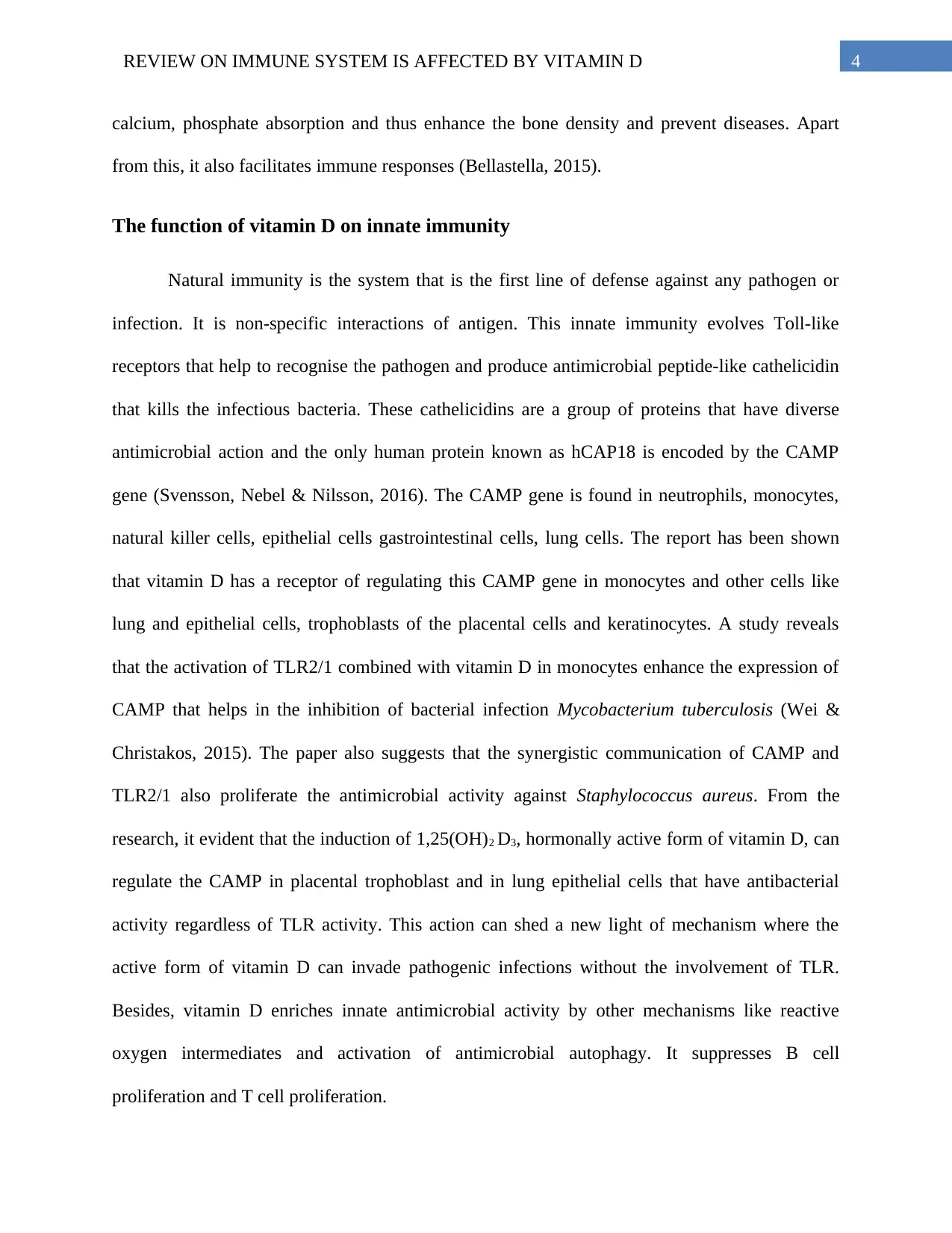
4REVIEW ON IMMUNE SYSTEM IS AFFECTED BY VITAMIN D
calcium, phosphate absorption and thus enhance the bone density and prevent diseases. Apart
from this, it also facilitates immune responses (Bellastella, 2015).
The function of vitamin D on innate immunity
Natural immunity is the system that is the first line of defense against any pathogen or
infection. It is non-specific interactions of antigen. This innate immunity evolves Toll-like
receptors that help to recognise the pathogen and produce antimicrobial peptide-like cathelicidin
that kills the infectious bacteria. These cathelicidins are a group of proteins that have diverse
antimicrobial action and the only human protein known as hCAP18 is encoded by the CAMP
gene (Svensson, Nebel & Nilsson, 2016). The CAMP gene is found in neutrophils, monocytes,
natural killer cells, epithelial cells gastrointestinal cells, lung cells. The report has been shown
that vitamin D has a receptor of regulating this CAMP gene in monocytes and other cells like
lung and epithelial cells, trophoblasts of the placental cells and keratinocytes. A study reveals
that the activation of TLR2/1 combined with vitamin D in monocytes enhance the expression of
CAMP that helps in the inhibition of bacterial infection Mycobacterium tuberculosis (Wei &
Christakos, 2015). The paper also suggests that the synergistic communication of CAMP and
TLR2/1 also proliferate the antimicrobial activity against Staphylococcus aureus. From the
research, it evident that the induction of 1,25(OH)2 D3, hormonally active form of vitamin D, can
regulate the CAMP in placental trophoblast and in lung epithelial cells that have antibacterial
activity regardless of TLR activity. This action can shed a new light of mechanism where the
active form of vitamin D can invade pathogenic infections without the involvement of TLR.
Besides, vitamin D enriches innate antimicrobial activity by other mechanisms like reactive
oxygen intermediates and activation of antimicrobial autophagy. It suppresses B cell
proliferation and T cell proliferation.
calcium, phosphate absorption and thus enhance the bone density and prevent diseases. Apart
from this, it also facilitates immune responses (Bellastella, 2015).
The function of vitamin D on innate immunity
Natural immunity is the system that is the first line of defense against any pathogen or
infection. It is non-specific interactions of antigen. This innate immunity evolves Toll-like
receptors that help to recognise the pathogen and produce antimicrobial peptide-like cathelicidin
that kills the infectious bacteria. These cathelicidins are a group of proteins that have diverse
antimicrobial action and the only human protein known as hCAP18 is encoded by the CAMP
gene (Svensson, Nebel & Nilsson, 2016). The CAMP gene is found in neutrophils, monocytes,
natural killer cells, epithelial cells gastrointestinal cells, lung cells. The report has been shown
that vitamin D has a receptor of regulating this CAMP gene in monocytes and other cells like
lung and epithelial cells, trophoblasts of the placental cells and keratinocytes. A study reveals
that the activation of TLR2/1 combined with vitamin D in monocytes enhance the expression of
CAMP that helps in the inhibition of bacterial infection Mycobacterium tuberculosis (Wei &
Christakos, 2015). The paper also suggests that the synergistic communication of CAMP and
TLR2/1 also proliferate the antimicrobial activity against Staphylococcus aureus. From the
research, it evident that the induction of 1,25(OH)2 D3, hormonally active form of vitamin D, can
regulate the CAMP in placental trophoblast and in lung epithelial cells that have antibacterial
activity regardless of TLR activity. This action can shed a new light of mechanism where the
active form of vitamin D can invade pathogenic infections without the involvement of TLR.
Besides, vitamin D enriches innate antimicrobial activity by other mechanisms like reactive
oxygen intermediates and activation of antimicrobial autophagy. It suppresses B cell
proliferation and T cell proliferation.
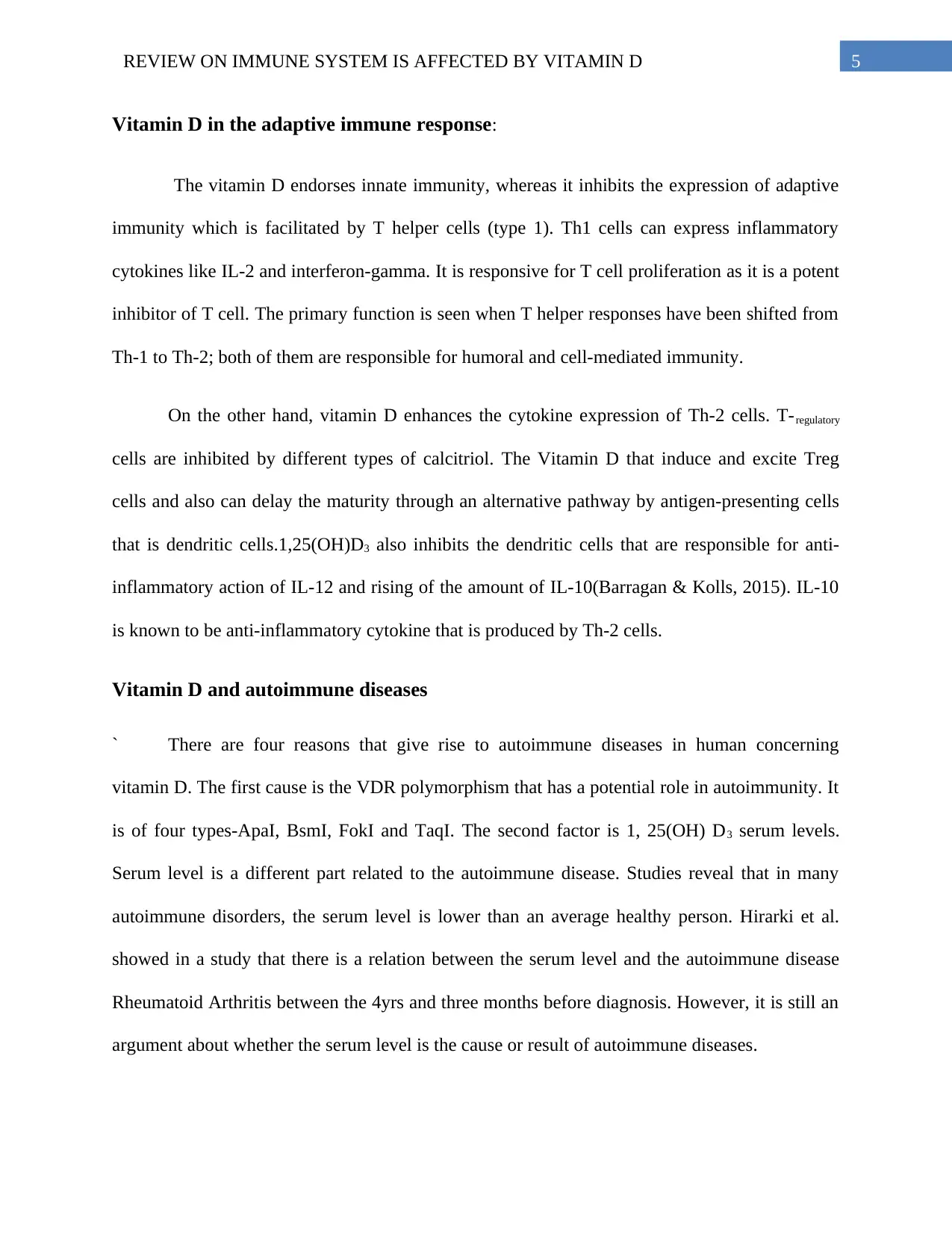
5REVIEW ON IMMUNE SYSTEM IS AFFECTED BY VITAMIN D
Vitamin D in the adaptive immune response:
The vitamin D endorses innate immunity, whereas it inhibits the expression of adaptive
immunity which is facilitated by T helper cells (type 1). Th1 cells can express inflammatory
cytokines like IL-2 and interferon-gamma. It is responsive for T cell proliferation as it is a potent
inhibitor of T cell. The primary function is seen when T helper responses have been shifted from
Th-1 to Th-2; both of them are responsible for humoral and cell-mediated immunity.
On the other hand, vitamin D enhances the cytokine expression of Th-2 cells. T-regulatory
cells are inhibited by different types of calcitriol. The Vitamin D that induce and excite Treg
cells and also can delay the maturity through an alternative pathway by antigen-presenting cells
that is dendritic cells.1,25(OH)D3 also inhibits the dendritic cells that are responsible for anti-
inflammatory action of IL-12 and rising of the amount of IL-10(Barragan & Kolls, 2015). IL-10
is known to be anti-inflammatory cytokine that is produced by Th-2 cells.
Vitamin D and autoimmune diseases
` There are four reasons that give rise to autoimmune diseases in human concerning
vitamin D. The first cause is the VDR polymorphism that has a potential role in autoimmunity. It
is of four types-ApaI, BsmI, FokI and TaqI. The second factor is 1, 25(OH) D3 serum levels.
Serum level is a different part related to the autoimmune disease. Studies reveal that in many
autoimmune disorders, the serum level is lower than an average healthy person. Hirarki et al.
showed in a study that there is a relation between the serum level and the autoimmune disease
Rheumatoid Arthritis between the 4yrs and three months before diagnosis. However, it is still an
argument about whether the serum level is the cause or result of autoimmune diseases.
Vitamin D in the adaptive immune response:
The vitamin D endorses innate immunity, whereas it inhibits the expression of adaptive
immunity which is facilitated by T helper cells (type 1). Th1 cells can express inflammatory
cytokines like IL-2 and interferon-gamma. It is responsive for T cell proliferation as it is a potent
inhibitor of T cell. The primary function is seen when T helper responses have been shifted from
Th-1 to Th-2; both of them are responsible for humoral and cell-mediated immunity.
On the other hand, vitamin D enhances the cytokine expression of Th-2 cells. T-regulatory
cells are inhibited by different types of calcitriol. The Vitamin D that induce and excite Treg
cells and also can delay the maturity through an alternative pathway by antigen-presenting cells
that is dendritic cells.1,25(OH)D3 also inhibits the dendritic cells that are responsible for anti-
inflammatory action of IL-12 and rising of the amount of IL-10(Barragan & Kolls, 2015). IL-10
is known to be anti-inflammatory cytokine that is produced by Th-2 cells.
Vitamin D and autoimmune diseases
` There are four reasons that give rise to autoimmune diseases in human concerning
vitamin D. The first cause is the VDR polymorphism that has a potential role in autoimmunity. It
is of four types-ApaI, BsmI, FokI and TaqI. The second factor is 1, 25(OH) D3 serum levels.
Serum level is a different part related to the autoimmune disease. Studies reveal that in many
autoimmune disorders, the serum level is lower than an average healthy person. Hirarki et al.
showed in a study that there is a relation between the serum level and the autoimmune disease
Rheumatoid Arthritis between the 4yrs and three months before diagnosis. However, it is still an
argument about whether the serum level is the cause or result of autoimmune diseases.
⊘ This is a preview!⊘
Do you want full access?
Subscribe today to unlock all pages.

Trusted by 1+ million students worldwide
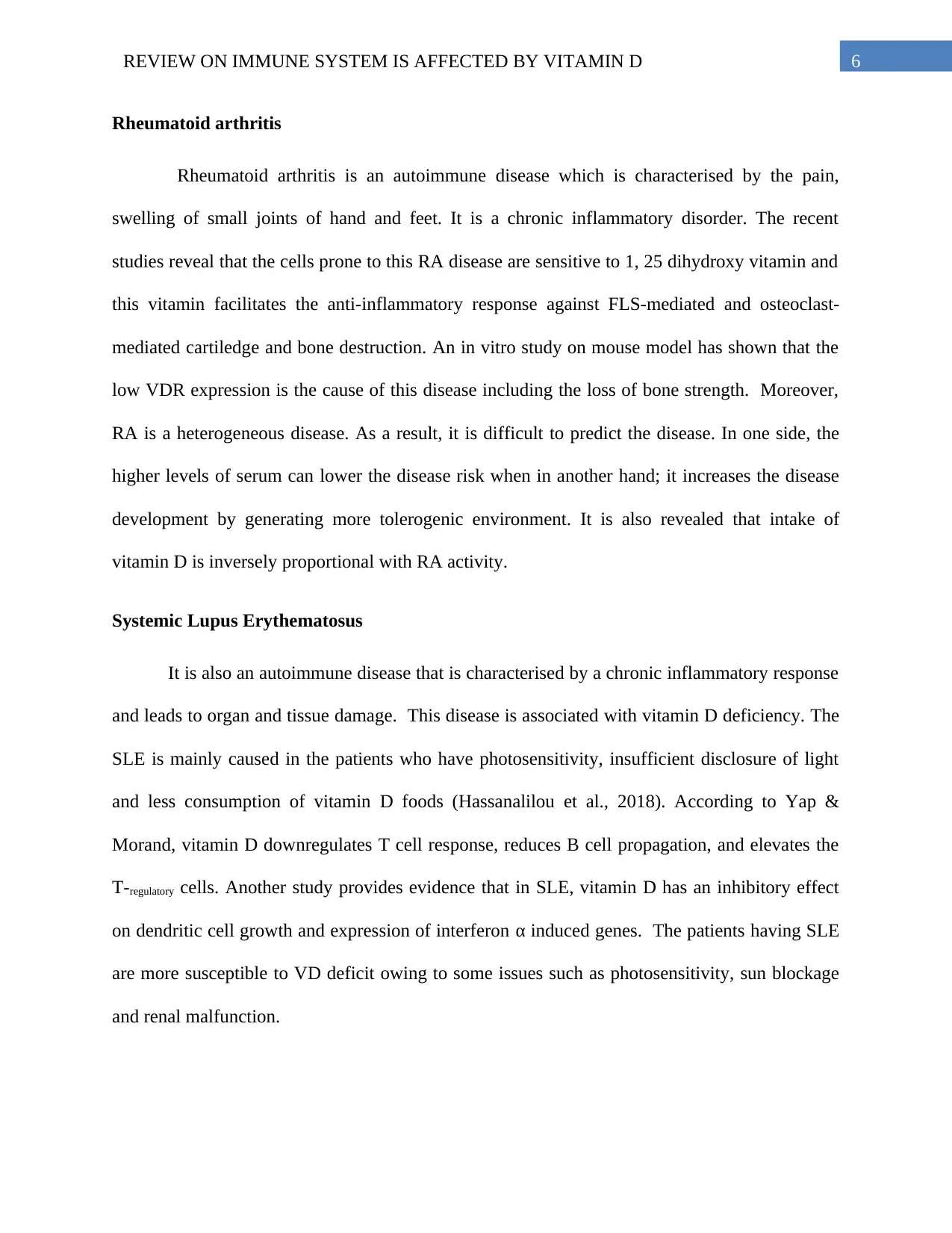
6REVIEW ON IMMUNE SYSTEM IS AFFECTED BY VITAMIN D
Rheumatoid arthritis
Rheumatoid arthritis is an autoimmune disease which is characterised by the pain,
swelling of small joints of hand and feet. It is a chronic inflammatory disorder. The recent
studies reveal that the cells prone to this RA disease are sensitive to 1, 25 dihydroxy vitamin and
this vitamin facilitates the anti-inflammatory response against FLS-mediated and osteoclast-
mediated cartiledge and bone destruction. An in vitro study on mouse model has shown that the
low VDR expression is the cause of this disease including the loss of bone strength. Moreover,
RA is a heterogeneous disease. As a result, it is difficult to predict the disease. In one side, the
higher levels of serum can lower the disease risk when in another hand; it increases the disease
development by generating more tolerogenic environment. It is also revealed that intake of
vitamin D is inversely proportional with RA activity.
Systemic Lupus Erythematosus
It is also an autoimmune disease that is characterised by a chronic inflammatory response
and leads to organ and tissue damage. This disease is associated with vitamin D deficiency. The
SLE is mainly caused in the patients who have photosensitivity, insufficient disclosure of light
and less consumption of vitamin D foods (Hassanalilou et al., 2018). According to Yap &
Morand, vitamin D downregulates T cell response, reduces B cell propagation, and elevates the
T-regulatory cells. Another study provides evidence that in SLE, vitamin D has an inhibitory effect
on dendritic cell growth and expression of interferon α induced genes. The patients having SLE
are more susceptible to VD deficit owing to some issues such as photosensitivity, sun blockage
and renal malfunction.
Rheumatoid arthritis
Rheumatoid arthritis is an autoimmune disease which is characterised by the pain,
swelling of small joints of hand and feet. It is a chronic inflammatory disorder. The recent
studies reveal that the cells prone to this RA disease are sensitive to 1, 25 dihydroxy vitamin and
this vitamin facilitates the anti-inflammatory response against FLS-mediated and osteoclast-
mediated cartiledge and bone destruction. An in vitro study on mouse model has shown that the
low VDR expression is the cause of this disease including the loss of bone strength. Moreover,
RA is a heterogeneous disease. As a result, it is difficult to predict the disease. In one side, the
higher levels of serum can lower the disease risk when in another hand; it increases the disease
development by generating more tolerogenic environment. It is also revealed that intake of
vitamin D is inversely proportional with RA activity.
Systemic Lupus Erythematosus
It is also an autoimmune disease that is characterised by a chronic inflammatory response
and leads to organ and tissue damage. This disease is associated with vitamin D deficiency. The
SLE is mainly caused in the patients who have photosensitivity, insufficient disclosure of light
and less consumption of vitamin D foods (Hassanalilou et al., 2018). According to Yap &
Morand, vitamin D downregulates T cell response, reduces B cell propagation, and elevates the
T-regulatory cells. Another study provides evidence that in SLE, vitamin D has an inhibitory effect
on dendritic cell growth and expression of interferon α induced genes. The patients having SLE
are more susceptible to VD deficit owing to some issues such as photosensitivity, sun blockage
and renal malfunction.
Paraphrase This Document
Need a fresh take? Get an instant paraphrase of this document with our AI Paraphraser
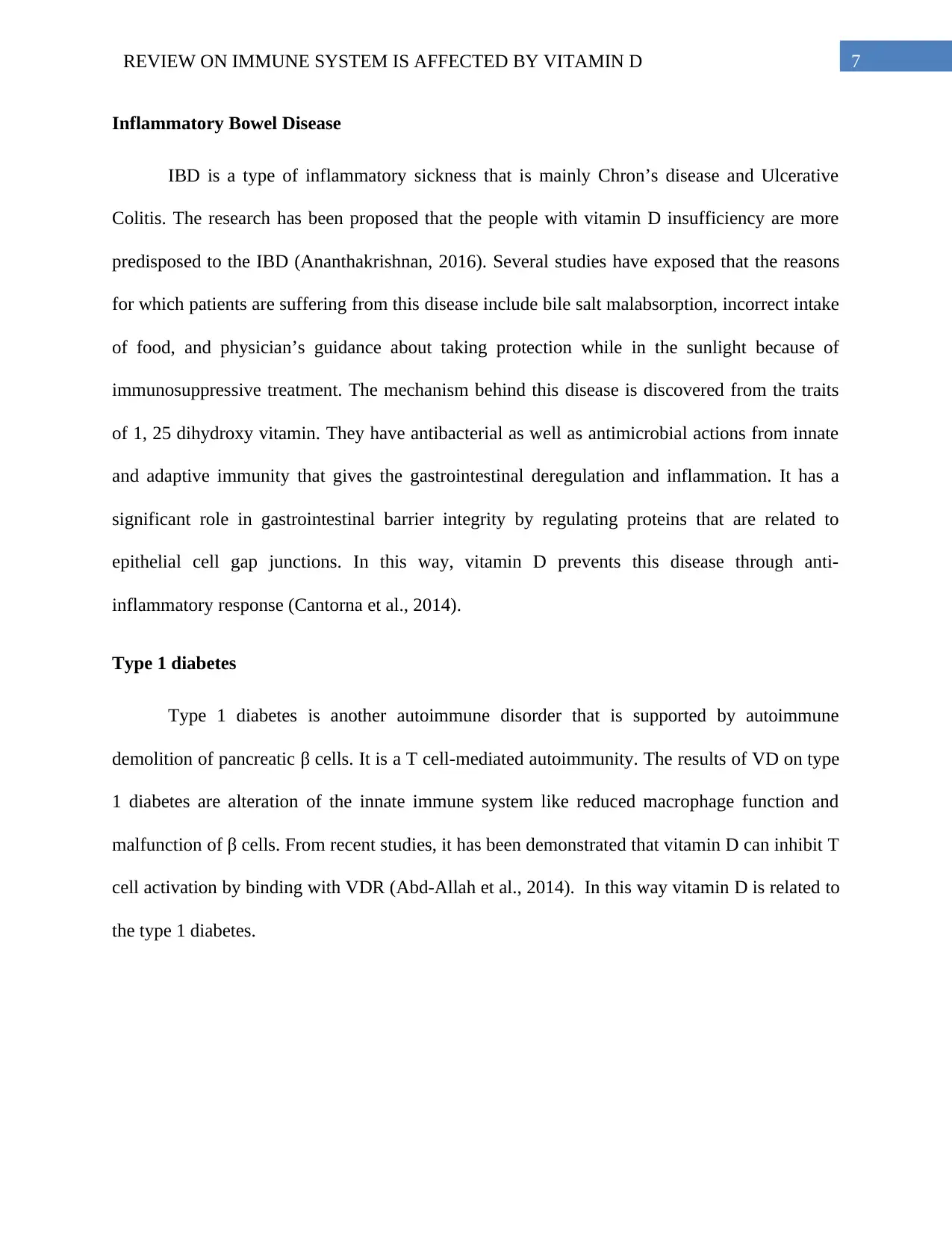
7REVIEW ON IMMUNE SYSTEM IS AFFECTED BY VITAMIN D
Inflammatory Bowel Disease
IBD is a type of inflammatory sickness that is mainly Chron’s disease and Ulcerative
Colitis. The research has been proposed that the people with vitamin D insufficiency are more
predisposed to the IBD (Ananthakrishnan, 2016). Several studies have exposed that the reasons
for which patients are suffering from this disease include bile salt malabsorption, incorrect intake
of food, and physician’s guidance about taking protection while in the sunlight because of
immunosuppressive treatment. The mechanism behind this disease is discovered from the traits
of 1, 25 dihydroxy vitamin. They have antibacterial as well as antimicrobial actions from innate
and adaptive immunity that gives the gastrointestinal deregulation and inflammation. It has a
significant role in gastrointestinal barrier integrity by regulating proteins that are related to
epithelial cell gap junctions. In this way, vitamin D prevents this disease through anti-
inflammatory response (Cantorna et al., 2014).
Type 1 diabetes
Type 1 diabetes is another autoimmune disorder that is supported by autoimmune
demolition of pancreatic β cells. It is a T cell-mediated autoimmunity. The results of VD on type
1 diabetes are alteration of the innate immune system like reduced macrophage function and
malfunction of β cells. From recent studies, it has been demonstrated that vitamin D can inhibit T
cell activation by binding with VDR (Abd-Allah et al., 2014). In this way vitamin D is related to
the type 1 diabetes.
Inflammatory Bowel Disease
IBD is a type of inflammatory sickness that is mainly Chron’s disease and Ulcerative
Colitis. The research has been proposed that the people with vitamin D insufficiency are more
predisposed to the IBD (Ananthakrishnan, 2016). Several studies have exposed that the reasons
for which patients are suffering from this disease include bile salt malabsorption, incorrect intake
of food, and physician’s guidance about taking protection while in the sunlight because of
immunosuppressive treatment. The mechanism behind this disease is discovered from the traits
of 1, 25 dihydroxy vitamin. They have antibacterial as well as antimicrobial actions from innate
and adaptive immunity that gives the gastrointestinal deregulation and inflammation. It has a
significant role in gastrointestinal barrier integrity by regulating proteins that are related to
epithelial cell gap junctions. In this way, vitamin D prevents this disease through anti-
inflammatory response (Cantorna et al., 2014).
Type 1 diabetes
Type 1 diabetes is another autoimmune disorder that is supported by autoimmune
demolition of pancreatic β cells. It is a T cell-mediated autoimmunity. The results of VD on type
1 diabetes are alteration of the innate immune system like reduced macrophage function and
malfunction of β cells. From recent studies, it has been demonstrated that vitamin D can inhibit T
cell activation by binding with VDR (Abd-Allah et al., 2014). In this way vitamin D is related to
the type 1 diabetes.
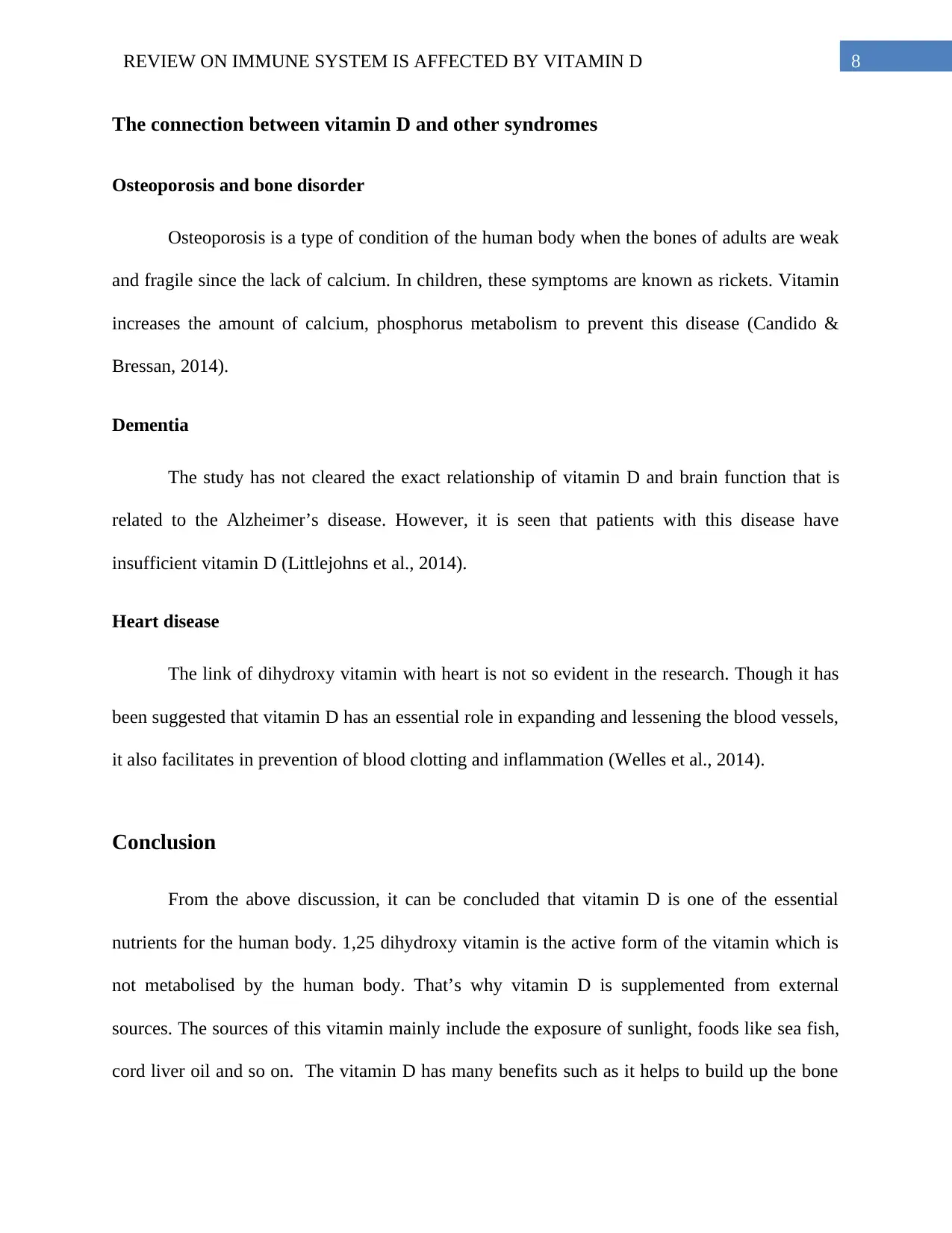
8REVIEW ON IMMUNE SYSTEM IS AFFECTED BY VITAMIN D
The connection between vitamin D and other syndromes
Osteoporosis and bone disorder
Osteoporosis is a type of condition of the human body when the bones of adults are weak
and fragile since the lack of calcium. In children, these symptoms are known as rickets. Vitamin
increases the amount of calcium, phosphorus metabolism to prevent this disease (Candido &
Bressan, 2014).
Dementia
The study has not cleared the exact relationship of vitamin D and brain function that is
related to the Alzheimer’s disease. However, it is seen that patients with this disease have
insufficient vitamin D (Littlejohns et al., 2014).
Heart disease
The link of dihydroxy vitamin with heart is not so evident in the research. Though it has
been suggested that vitamin D has an essential role in expanding and lessening the blood vessels,
it also facilitates in prevention of blood clotting and inflammation (Welles et al., 2014).
Conclusion
From the above discussion, it can be concluded that vitamin D is one of the essential
nutrients for the human body. 1,25 dihydroxy vitamin is the active form of the vitamin which is
not metabolised by the human body. That’s why vitamin D is supplemented from external
sources. The sources of this vitamin mainly include the exposure of sunlight, foods like sea fish,
cord liver oil and so on. The vitamin D has many benefits such as it helps to build up the bone
The connection between vitamin D and other syndromes
Osteoporosis and bone disorder
Osteoporosis is a type of condition of the human body when the bones of adults are weak
and fragile since the lack of calcium. In children, these symptoms are known as rickets. Vitamin
increases the amount of calcium, phosphorus metabolism to prevent this disease (Candido &
Bressan, 2014).
Dementia
The study has not cleared the exact relationship of vitamin D and brain function that is
related to the Alzheimer’s disease. However, it is seen that patients with this disease have
insufficient vitamin D (Littlejohns et al., 2014).
Heart disease
The link of dihydroxy vitamin with heart is not so evident in the research. Though it has
been suggested that vitamin D has an essential role in expanding and lessening the blood vessels,
it also facilitates in prevention of blood clotting and inflammation (Welles et al., 2014).
Conclusion
From the above discussion, it can be concluded that vitamin D is one of the essential
nutrients for the human body. 1,25 dihydroxy vitamin is the active form of the vitamin which is
not metabolised by the human body. That’s why vitamin D is supplemented from external
sources. The sources of this vitamin mainly include the exposure of sunlight, foods like sea fish,
cord liver oil and so on. The vitamin D has many benefits such as it helps to build up the bone
⊘ This is a preview!⊘
Do you want full access?
Subscribe today to unlock all pages.

Trusted by 1+ million students worldwide
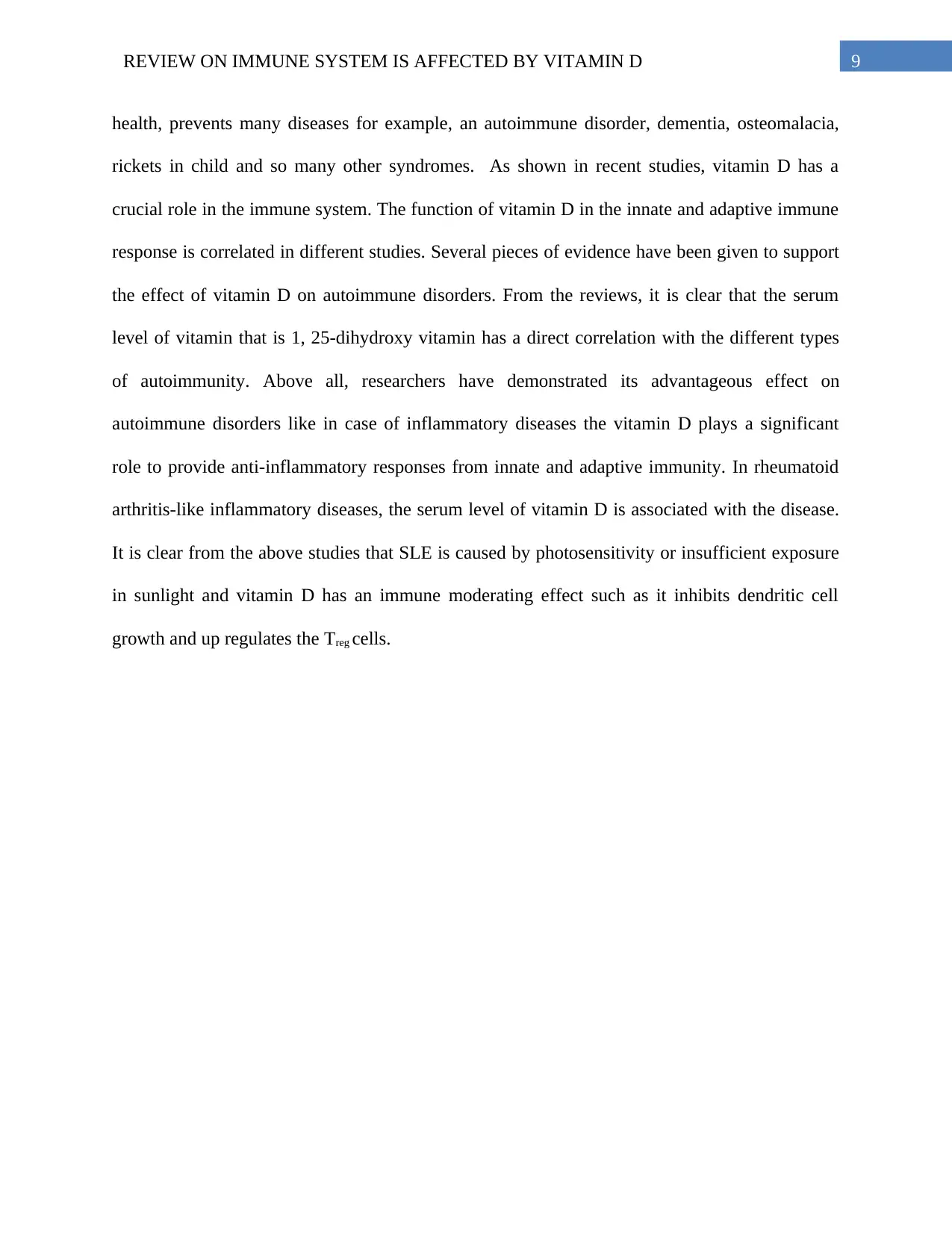
9REVIEW ON IMMUNE SYSTEM IS AFFECTED BY VITAMIN D
health, prevents many diseases for example, an autoimmune disorder, dementia, osteomalacia,
rickets in child and so many other syndromes. As shown in recent studies, vitamin D has a
crucial role in the immune system. The function of vitamin D in the innate and adaptive immune
response is correlated in different studies. Several pieces of evidence have been given to support
the effect of vitamin D on autoimmune disorders. From the reviews, it is clear that the serum
level of vitamin that is 1, 25-dihydroxy vitamin has a direct correlation with the different types
of autoimmunity. Above all, researchers have demonstrated its advantageous effect on
autoimmune disorders like in case of inflammatory diseases the vitamin D plays a significant
role to provide anti-inflammatory responses from innate and adaptive immunity. In rheumatoid
arthritis-like inflammatory diseases, the serum level of vitamin D is associated with the disease.
It is clear from the above studies that SLE is caused by photosensitivity or insufficient exposure
in sunlight and vitamin D has an immune moderating effect such as it inhibits dendritic cell
growth and up regulates the Treg cells.
health, prevents many diseases for example, an autoimmune disorder, dementia, osteomalacia,
rickets in child and so many other syndromes. As shown in recent studies, vitamin D has a
crucial role in the immune system. The function of vitamin D in the innate and adaptive immune
response is correlated in different studies. Several pieces of evidence have been given to support
the effect of vitamin D on autoimmune disorders. From the reviews, it is clear that the serum
level of vitamin that is 1, 25-dihydroxy vitamin has a direct correlation with the different types
of autoimmunity. Above all, researchers have demonstrated its advantageous effect on
autoimmune disorders like in case of inflammatory diseases the vitamin D plays a significant
role to provide anti-inflammatory responses from innate and adaptive immunity. In rheumatoid
arthritis-like inflammatory diseases, the serum level of vitamin D is associated with the disease.
It is clear from the above studies that SLE is caused by photosensitivity or insufficient exposure
in sunlight and vitamin D has an immune moderating effect such as it inhibits dendritic cell
growth and up regulates the Treg cells.
Paraphrase This Document
Need a fresh take? Get an instant paraphrase of this document with our AI Paraphraser
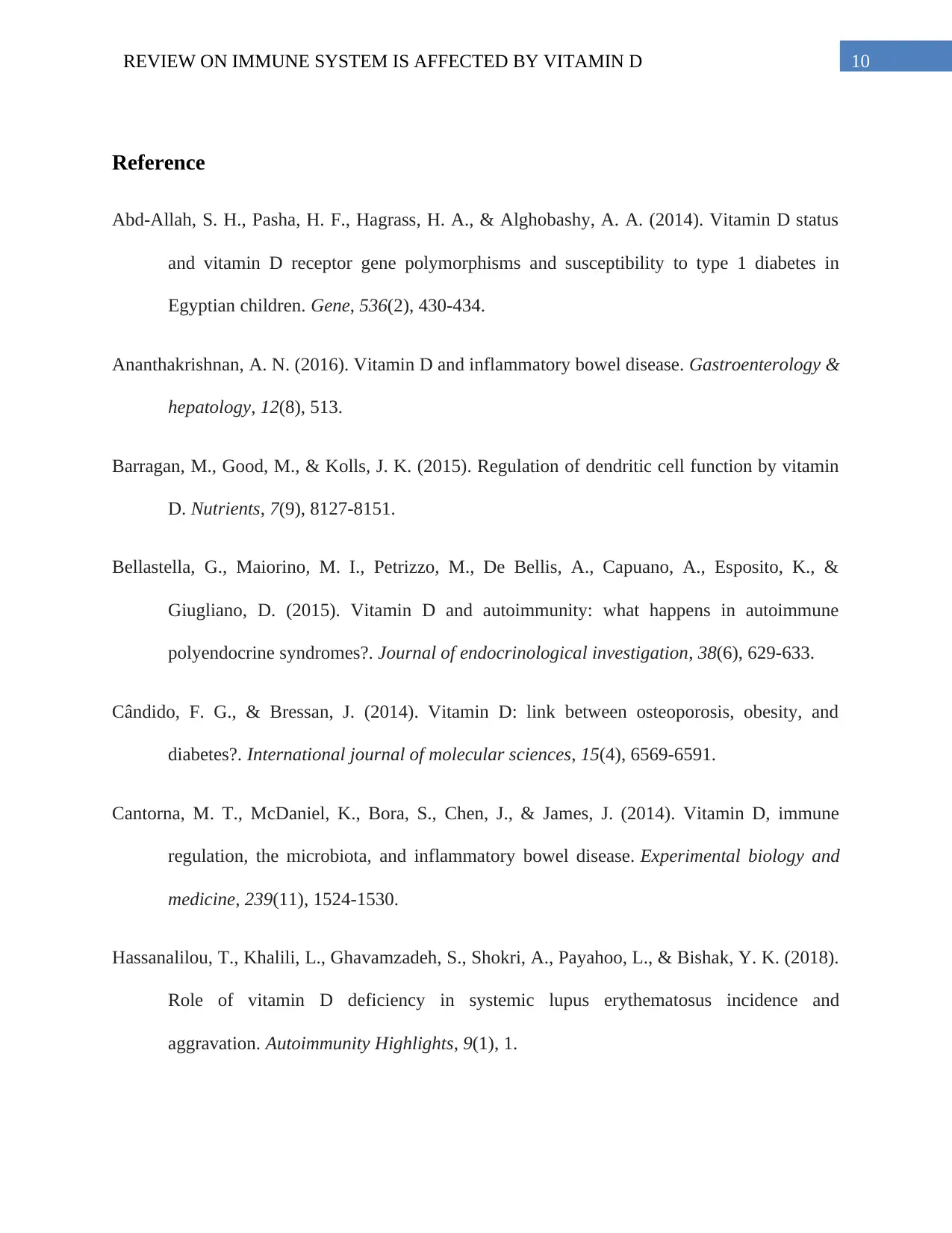
10REVIEW ON IMMUNE SYSTEM IS AFFECTED BY VITAMIN D
Reference
Abd-Allah, S. H., Pasha, H. F., Hagrass, H. A., & Alghobashy, A. A. (2014). Vitamin D status
and vitamin D receptor gene polymorphisms and susceptibility to type 1 diabetes in
Egyptian children. Gene, 536(2), 430-434.
Ananthakrishnan, A. N. (2016). Vitamin D and inflammatory bowel disease. Gastroenterology &
hepatology, 12(8), 513.
Barragan, M., Good, M., & Kolls, J. K. (2015). Regulation of dendritic cell function by vitamin
D. Nutrients, 7(9), 8127-8151.
Bellastella, G., Maiorino, M. I., Petrizzo, M., De Bellis, A., Capuano, A., Esposito, K., &
Giugliano, D. (2015). Vitamin D and autoimmunity: what happens in autoimmune
polyendocrine syndromes?. Journal of endocrinological investigation, 38(6), 629-633.
Cândido, F. G., & Bressan, J. (2014). Vitamin D: link between osteoporosis, obesity, and
diabetes?. International journal of molecular sciences, 15(4), 6569-6591.
Cantorna, M. T., McDaniel, K., Bora, S., Chen, J., & James, J. (2014). Vitamin D, immune
regulation, the microbiota, and inflammatory bowel disease. Experimental biology and
medicine, 239(11), 1524-1530.
Hassanalilou, T., Khalili, L., Ghavamzadeh, S., Shokri, A., Payahoo, L., & Bishak, Y. K. (2018).
Role of vitamin D deficiency in systemic lupus erythematosus incidence and
aggravation. Autoimmunity Highlights, 9(1), 1.
Reference
Abd-Allah, S. H., Pasha, H. F., Hagrass, H. A., & Alghobashy, A. A. (2014). Vitamin D status
and vitamin D receptor gene polymorphisms and susceptibility to type 1 diabetes in
Egyptian children. Gene, 536(2), 430-434.
Ananthakrishnan, A. N. (2016). Vitamin D and inflammatory bowel disease. Gastroenterology &
hepatology, 12(8), 513.
Barragan, M., Good, M., & Kolls, J. K. (2015). Regulation of dendritic cell function by vitamin
D. Nutrients, 7(9), 8127-8151.
Bellastella, G., Maiorino, M. I., Petrizzo, M., De Bellis, A., Capuano, A., Esposito, K., &
Giugliano, D. (2015). Vitamin D and autoimmunity: what happens in autoimmune
polyendocrine syndromes?. Journal of endocrinological investigation, 38(6), 629-633.
Cândido, F. G., & Bressan, J. (2014). Vitamin D: link between osteoporosis, obesity, and
diabetes?. International journal of molecular sciences, 15(4), 6569-6591.
Cantorna, M. T., McDaniel, K., Bora, S., Chen, J., & James, J. (2014). Vitamin D, immune
regulation, the microbiota, and inflammatory bowel disease. Experimental biology and
medicine, 239(11), 1524-1530.
Hassanalilou, T., Khalili, L., Ghavamzadeh, S., Shokri, A., Payahoo, L., & Bishak, Y. K. (2018).
Role of vitamin D deficiency in systemic lupus erythematosus incidence and
aggravation. Autoimmunity Highlights, 9(1), 1.
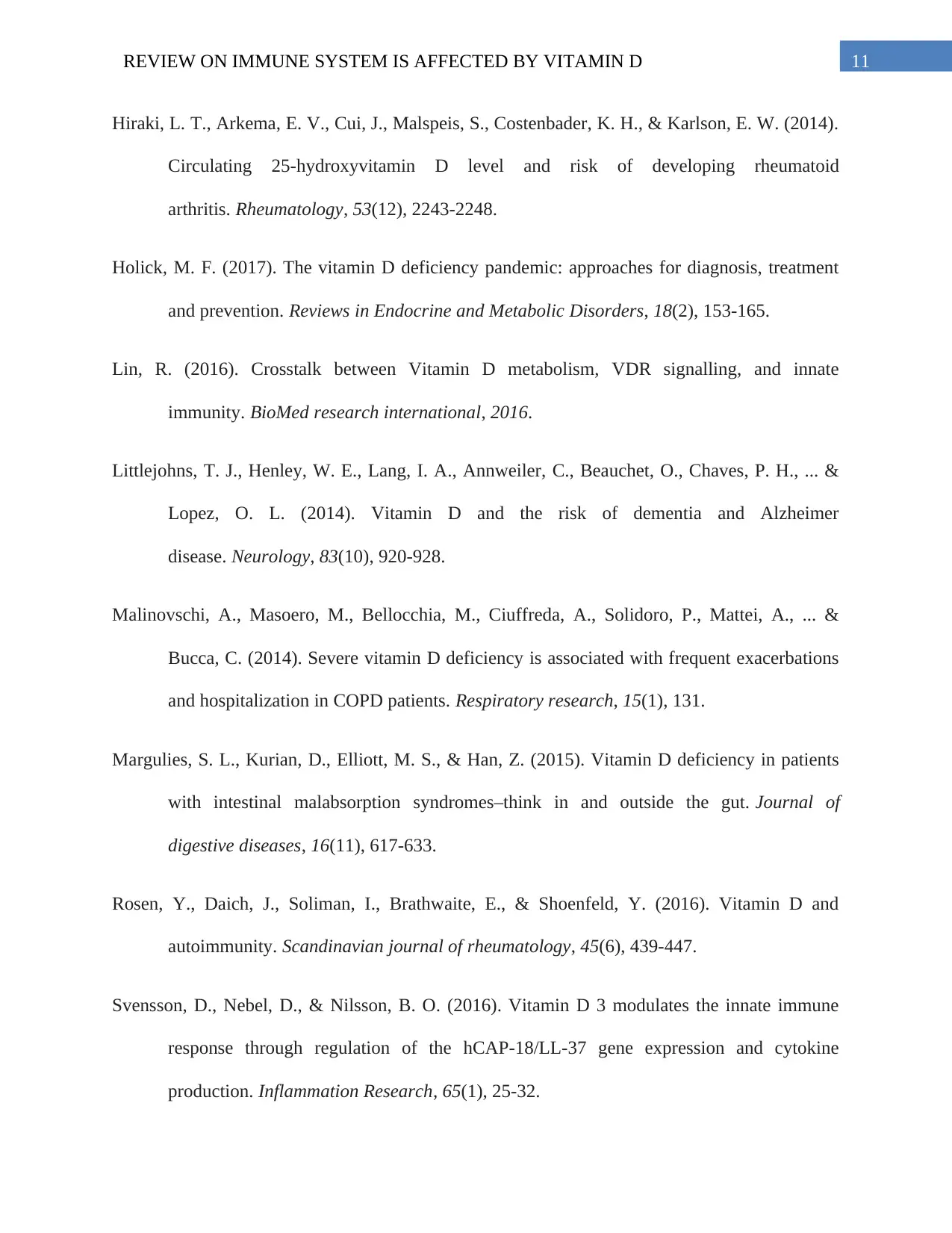
11REVIEW ON IMMUNE SYSTEM IS AFFECTED BY VITAMIN D
Hiraki, L. T., Arkema, E. V., Cui, J., Malspeis, S., Costenbader, K. H., & Karlson, E. W. (2014).
Circulating 25-hydroxyvitamin D level and risk of developing rheumatoid
arthritis. Rheumatology, 53(12), 2243-2248.
Holick, M. F. (2017). The vitamin D deficiency pandemic: approaches for diagnosis, treatment
and prevention. Reviews in Endocrine and Metabolic Disorders, 18(2), 153-165.
Lin, R. (2016). Crosstalk between Vitamin D metabolism, VDR signalling, and innate
immunity. BioMed research international, 2016.
Littlejohns, T. J., Henley, W. E., Lang, I. A., Annweiler, C., Beauchet, O., Chaves, P. H., ... &
Lopez, O. L. (2014). Vitamin D and the risk of dementia and Alzheimer
disease. Neurology, 83(10), 920-928.
Malinovschi, A., Masoero, M., Bellocchia, M., Ciuffreda, A., Solidoro, P., Mattei, A., ... &
Bucca, C. (2014). Severe vitamin D deficiency is associated with frequent exacerbations
and hospitalization in COPD patients. Respiratory research, 15(1), 131.
Margulies, S. L., Kurian, D., Elliott, M. S., & Han, Z. (2015). Vitamin D deficiency in patients
with intestinal malabsorption syndromes–think in and outside the gut. Journal of
digestive diseases, 16(11), 617-633.
Rosen, Y., Daich, J., Soliman, I., Brathwaite, E., & Shoenfeld, Y. (2016). Vitamin D and
autoimmunity. Scandinavian journal of rheumatology, 45(6), 439-447.
Svensson, D., Nebel, D., & Nilsson, B. O. (2016). Vitamin D 3 modulates the innate immune
response through regulation of the hCAP-18/LL-37 gene expression and cytokine
production. Inflammation Research, 65(1), 25-32.
Hiraki, L. T., Arkema, E. V., Cui, J., Malspeis, S., Costenbader, K. H., & Karlson, E. W. (2014).
Circulating 25-hydroxyvitamin D level and risk of developing rheumatoid
arthritis. Rheumatology, 53(12), 2243-2248.
Holick, M. F. (2017). The vitamin D deficiency pandemic: approaches for diagnosis, treatment
and prevention. Reviews in Endocrine and Metabolic Disorders, 18(2), 153-165.
Lin, R. (2016). Crosstalk between Vitamin D metabolism, VDR signalling, and innate
immunity. BioMed research international, 2016.
Littlejohns, T. J., Henley, W. E., Lang, I. A., Annweiler, C., Beauchet, O., Chaves, P. H., ... &
Lopez, O. L. (2014). Vitamin D and the risk of dementia and Alzheimer
disease. Neurology, 83(10), 920-928.
Malinovschi, A., Masoero, M., Bellocchia, M., Ciuffreda, A., Solidoro, P., Mattei, A., ... &
Bucca, C. (2014). Severe vitamin D deficiency is associated with frequent exacerbations
and hospitalization in COPD patients. Respiratory research, 15(1), 131.
Margulies, S. L., Kurian, D., Elliott, M. S., & Han, Z. (2015). Vitamin D deficiency in patients
with intestinal malabsorption syndromes–think in and outside the gut. Journal of
digestive diseases, 16(11), 617-633.
Rosen, Y., Daich, J., Soliman, I., Brathwaite, E., & Shoenfeld, Y. (2016). Vitamin D and
autoimmunity. Scandinavian journal of rheumatology, 45(6), 439-447.
Svensson, D., Nebel, D., & Nilsson, B. O. (2016). Vitamin D 3 modulates the innate immune
response through regulation of the hCAP-18/LL-37 gene expression and cytokine
production. Inflammation Research, 65(1), 25-32.
⊘ This is a preview!⊘
Do you want full access?
Subscribe today to unlock all pages.

Trusted by 1+ million students worldwide
1 out of 13
Related Documents
Your All-in-One AI-Powered Toolkit for Academic Success.
+13062052269
info@desklib.com
Available 24*7 on WhatsApp / Email
![[object Object]](/_next/static/media/star-bottom.7253800d.svg)
Unlock your academic potential
Copyright © 2020–2026 A2Z Services. All Rights Reserved. Developed and managed by ZUCOL.





